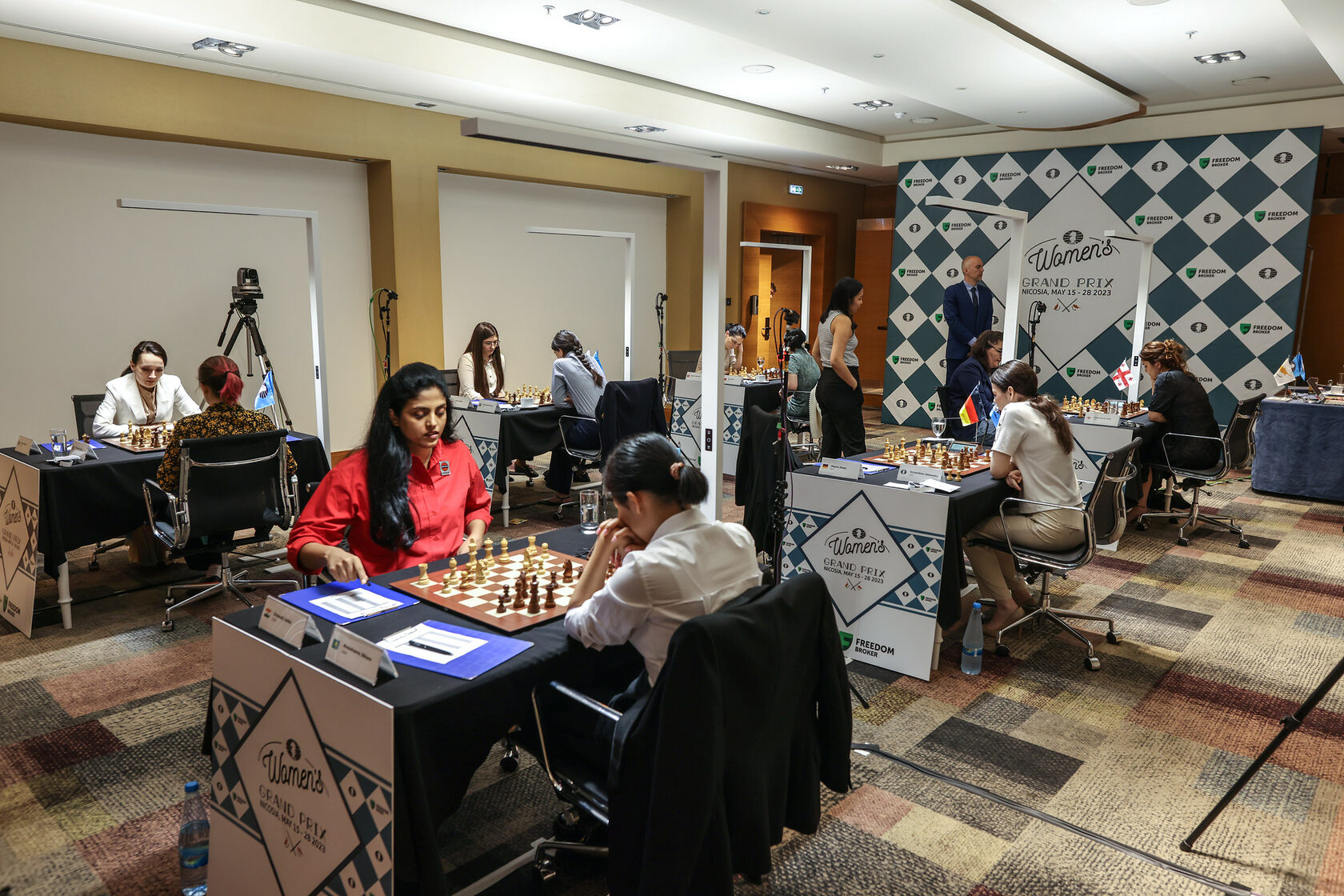IM Michael Rahal (Nicosia, Cyprus)
Photo: Mark Livshitz
May 16th 2023
The first round of the fourth leg of the 2022-2023 Women's Grand Prix kicked off this afternoon in the Hilton hotel in Nicosia, Cyprus.
After the introductions and reminders, Chief Arbiter Ivan Syrovy initiated the clocks punctually at three o'clock and the twelve players sat down to battle it out.
Vishy Anand, FIDE Deputy President and former five-times World Champion, and Timur Turlov, CEO of Freedom Holding Corp., made the ceremonial first moves for Harika Dronavalli and Bibisara Assaubayeva, respectively.
Photo: Mark Livshitz
May 16th 2023
The first round of the fourth leg of the 2022-2023 Women's Grand Prix kicked off this afternoon in the Hilton hotel in Nicosia, Cyprus.
After the introductions and reminders, Chief Arbiter Ivan Syrovy initiated the clocks punctually at three o'clock and the twelve players sat down to battle it out.
Vishy Anand, FIDE Deputy President and former five-times World Champion, and Timur Turlov, CEO of Freedom Holding Corp., made the ceremonial first moves for Harika Dronavalli and Bibisara Assaubayeva, respectively.
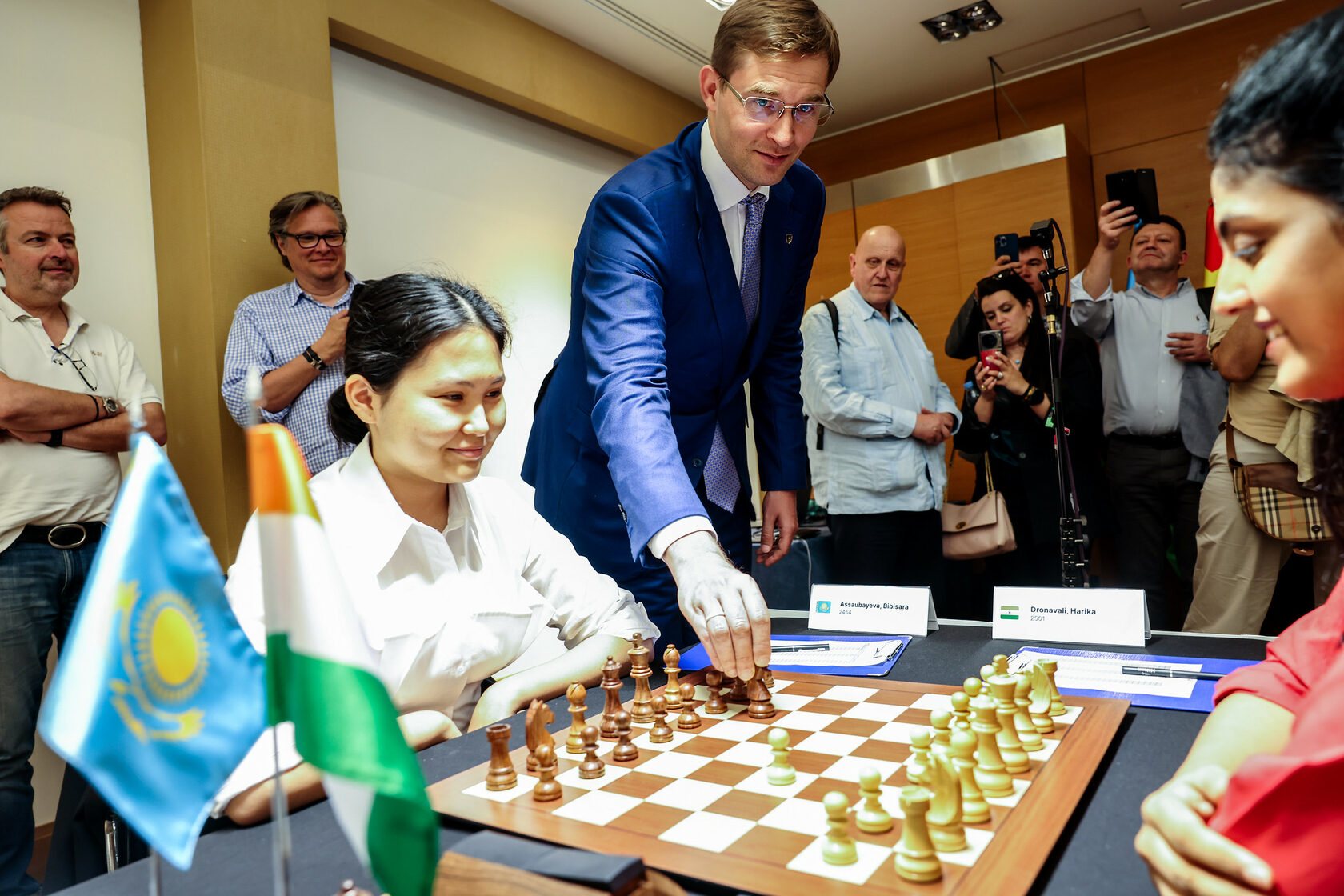
Notwithstanding the fact that women’s events are traditionally extremely hard-fought, the regulations of the tournament expressly forbid draw agreements before Black’s 30th has been played on the board, with the exception of move repetition or stalemate.
In addition, the 90-minute for 40 moves plus 30 extra minutes time control offers players the opportunity to create fantastic games: six decisive results in the six games is indeed a very rare occurrence.
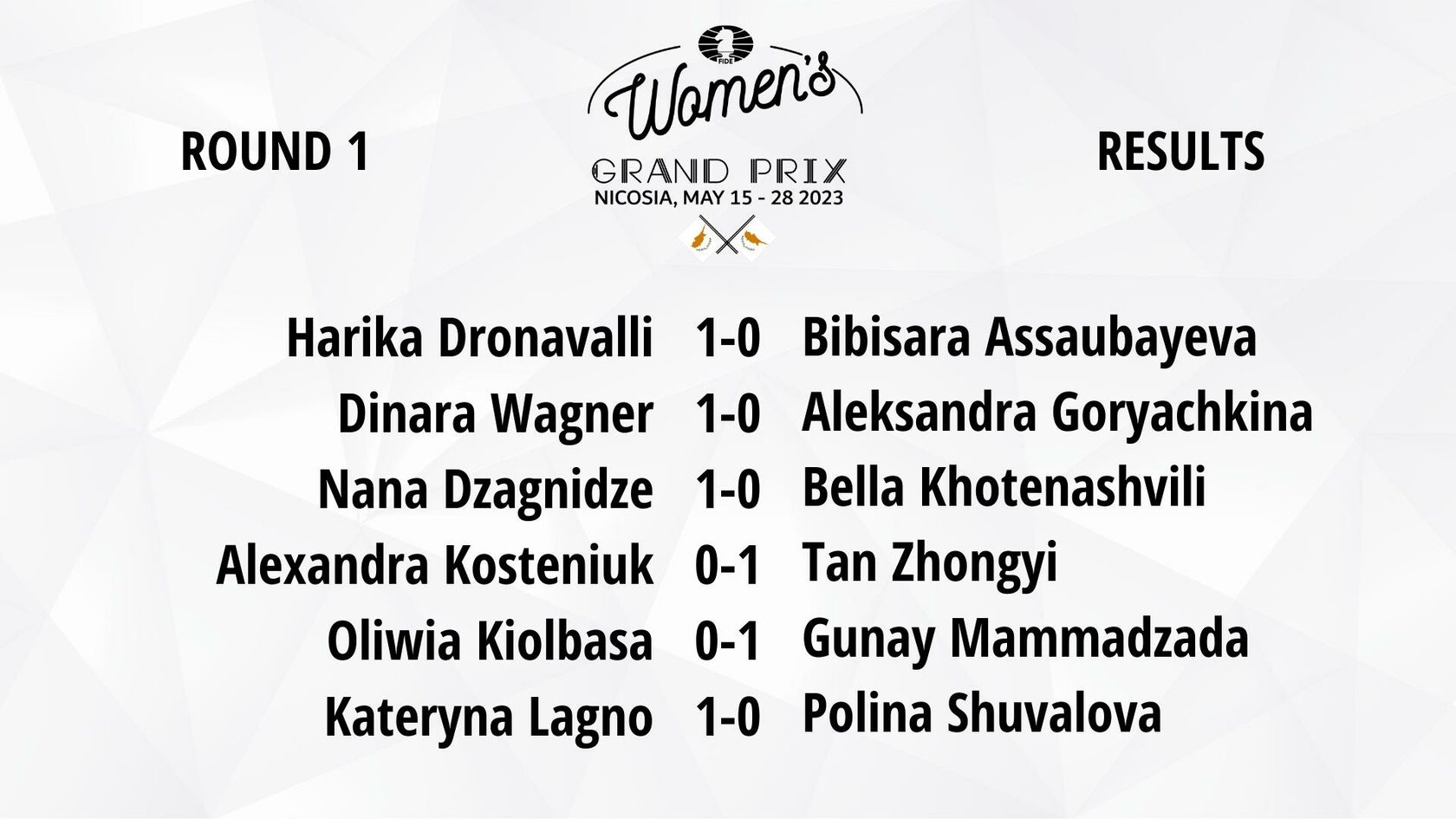
GM Dronavalli, Harika vs IM Assaubayeva, Bibisara (1-0)
Playing with the white pieces, Harika opened with 1.c4 against which Assaubayeva opted for 1…g6. After a few moves, the popular King’s Indian Defence was reached. Instead of going for one of the main lines, Harika decided to mix things up by playing an offbeat non-theoretical side-line, which included an early exchange of queens. It seemed that she was trying to avoid as much theory as possible.
The first key decision came on move fifteen. Harika surrendered her strong kingside bishop by means of 15.Bxc6 in an attempt to weaken her opponent’s pawn structure and unbalance the position. “I just played some offbeat line to try and play a position. At some point she just started to play really bad” Harika explained in her post-game interview.
In a strange decision by Assaubayeva, she returned the favour by surrendering her own bishop a few moves later (17…Bxc3) although the position remained balanced for many moves. However, as the endgame approached, one could see that Harika was enjoying her space advantage, superior pawn structure and better minor pieces.
In a textbook example of how to gradually improve her position, Harika grinded out the win in exemplary fashion.
WGM Wagner, Dinara vs GM Goryachkina, Aleksandra (1-0)
One of the main surprises of the afternoon was witnessing New Delhi winner Goryachkina lose her first-round game to Wagner.
Traditionally, one of Wagner’s main problems in previous legs of the Grand Prix was her time management. At least in today’s game, she seems to have left that problem behind.
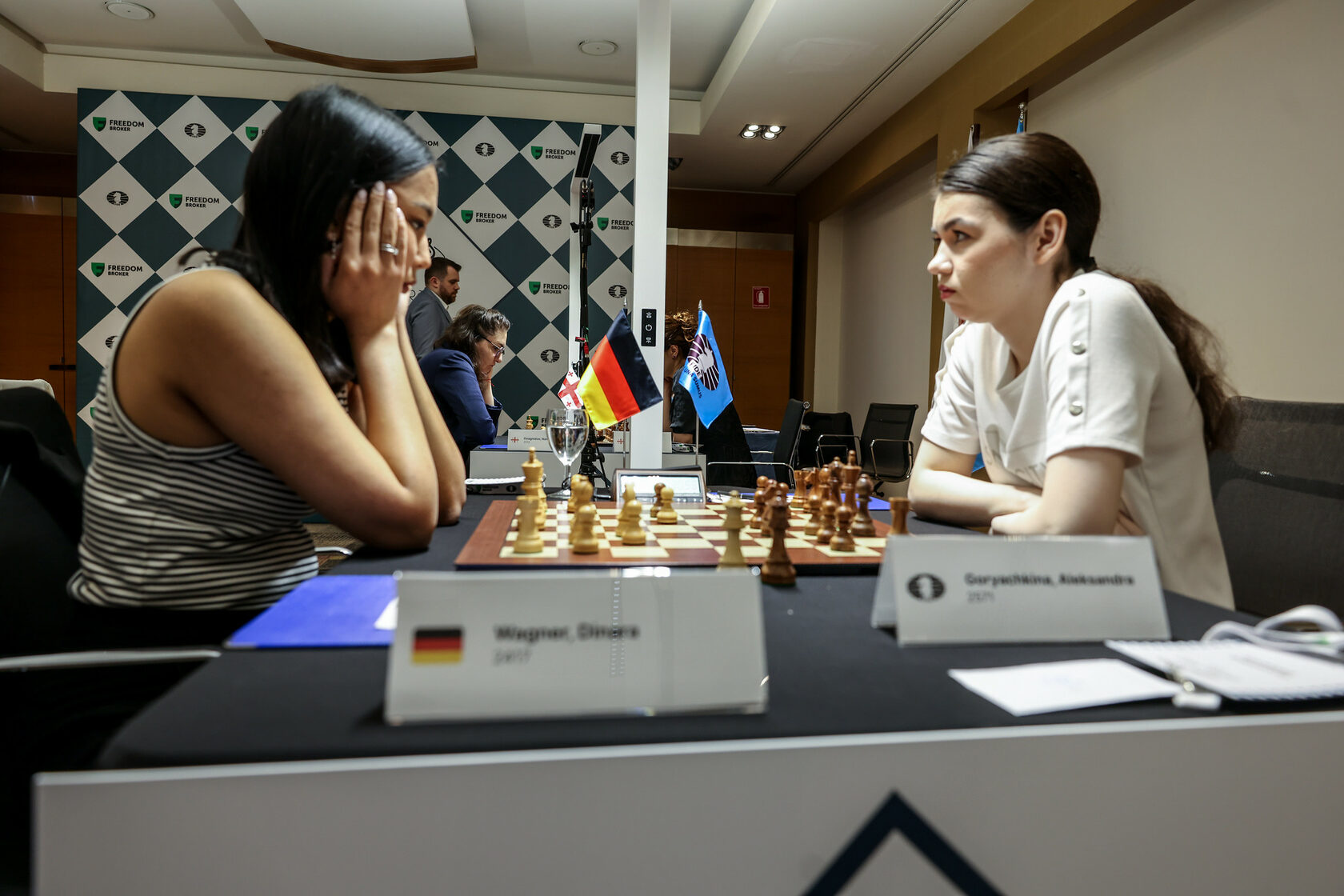
In a topical line of the Catalan Opening, both players demonstrated their deep knowledge of the variation, blitzing out their first sixteen moves. Goryachkina subsequently thought for nearly fifteen minutes before hitting her opponent with the novelty 16…b5, deviating from a recent game between top Indian youngsters Pranav and Praneeth, in which 16…h5 was the move.
However, possibly slightly unfamiliar with the resulting middlegame position, Goryachkina blundered with 22…Bf8 – instead, 22…Bxh3 would have led to an equal position. With a timely exchange on f6 Wagner weakened her opponent’s pawn structure, and pressed to the end in an opposite-coloured bishop ending with queen’s, in which she was always better.
GM Dzagnidze, Nana vs GM Khotenashvili, Bella (1-0)
The rules of the event oblige players of the same federation to face each other in the first round. Although being Olympic team colleagues and friends, Dzagnidze and Khotenashvili battled it out on the board today in the all-Georgian encounter.
“Generally, I really don’t like to play against my teammates, it is not comfortable for me to play against Georgian girls. And I think for them it’s not easy as well” said Dzagnidze in her postgame interview.
Playing Black, Khotenashvili went for the King’s Indian defence and definitely caught her opponent off-balance with her chosen line, obtaining the initiative very quickly. However, Dzagnidze kept her cool and reacted well: in the middlegame each player had a dangerous passed pawn and two strong bishops.
In a highly complex position, Dzagnidze missed a great chance to go for a win with 20.Nc6! instead of 20.Nc4 but was able to recover her options a few moves later. By means of a sequence of strong attacking moves, she coordinated her forces very well, winning first the d3 pawn and then by means of the pin on the c-file she was able to force the victory.
GM Kosteniuk, Alexandra vs GM Tan, Zhongyi (0-1)
Representing Switzerland for the first time in an official classical tournament – she did play a few Bundesliga team games previously - Kosteniuk opened as usual with 1.e4 and Tan Zhongyi opted for the Berlin defence in the Ruy Lopez.
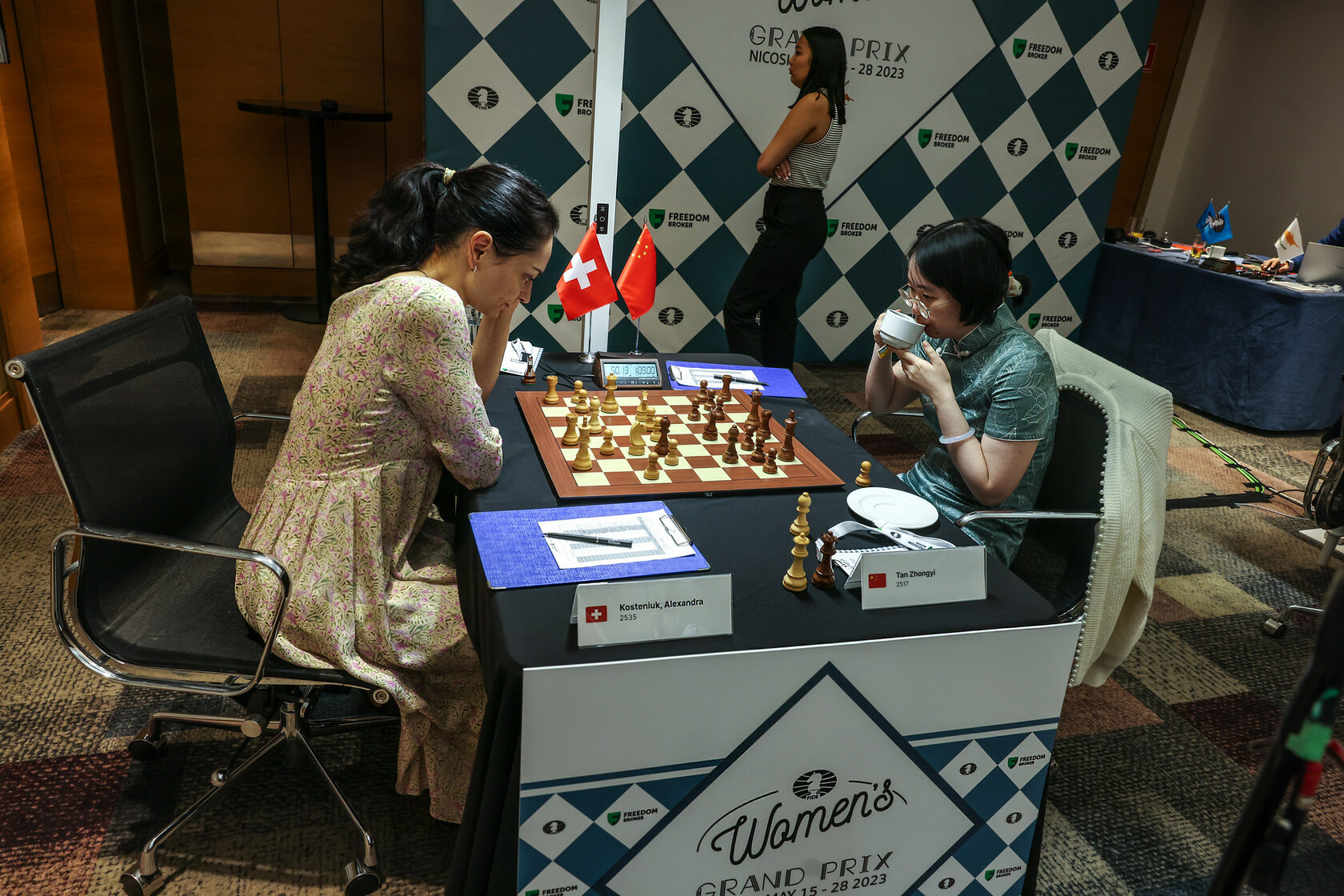
In exchange for a strong centre, Kosteniuk gave up the control of her f4 square, in addition to a weakened castled king, but according to the computer the position remained balanced.
Around move forty it seemed that the game might end in a draw by move repetition but the Chinese representative decided to force the issue with 43…h5.
The decision ultimately worked out well; under pressure, Kosteniuk blundered with 47.Qe7 which looks good on the surface, but allowed her opponent to coordinate her queen and bishop into a deadly attack.
IM Kiolbasa, Oliwia vs IM Mammadzada, Gunay (0-1)
Mammadzada had already made her debut in the Women’s Grand Prix in 2021, where she could only play the fourth and last event, in Gibraltar, as a reserve player, but ended on a high note, finishing in third place. For Kiolbasa, it was her first participation, replacing her Olympic national teammate Alina Kashlinskaya.
It’s always hard to know what happened in the opening preparation but something clearly went wrong for Kiolbasa today. In a complex Sicilian Najdorf, she went for the 6.h3 variation, but somewhere in the later part of the opening she went wrong, dropping her e-pawn along the way.
The move 15.Kf1 was definitely a step in the wrong direction but maybe the damage had already been done. Her acute time trouble didn’t make things easier: on move twenty she was already down to under two minutes. Mammadzada kept things simple, exchanging pieces for a completely won rook ending.
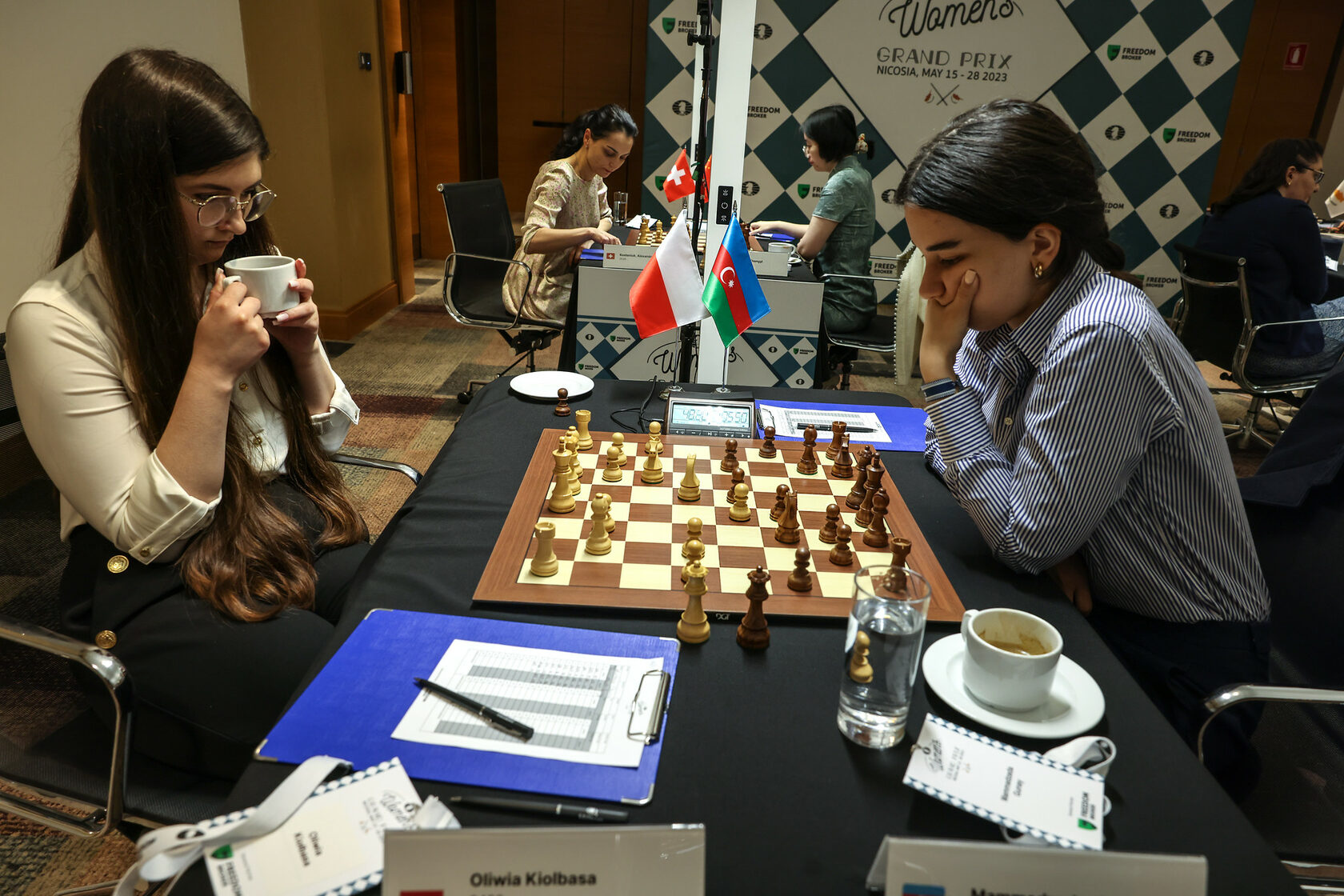
GM Lagno, Kateryna vs IM Shuvalova, Polina (1-0)
Both playing under the FIDE flag and, as per rules, Lagno and Shuvalova faced each other this afternoon in the first round. Lagno mixed things up a bit going for the classical Four Knights Opening, which she plays very rarely – Lagno is considered to be a Ruy Lopez specialist. For the most part, Shuvalova kept the balance although she did have to give up the bishop pair: as long as the position remained more or less closed, she was doing well.
However, with less than twenty minutes for the time control, Shuvalova used up eight and opened the game with 21…d5, a mistake probably due to a miscalculation. Lagno had several ways to play for an advantage, and she chose the safest – winning a pawn in addition to the bishop pair. Things started to look very grim for her opponent.
A few moves later Lagno had already started to pile up the pressure on her opponent’s kingside: she went for the kill and brought home the point in excellent fashion.
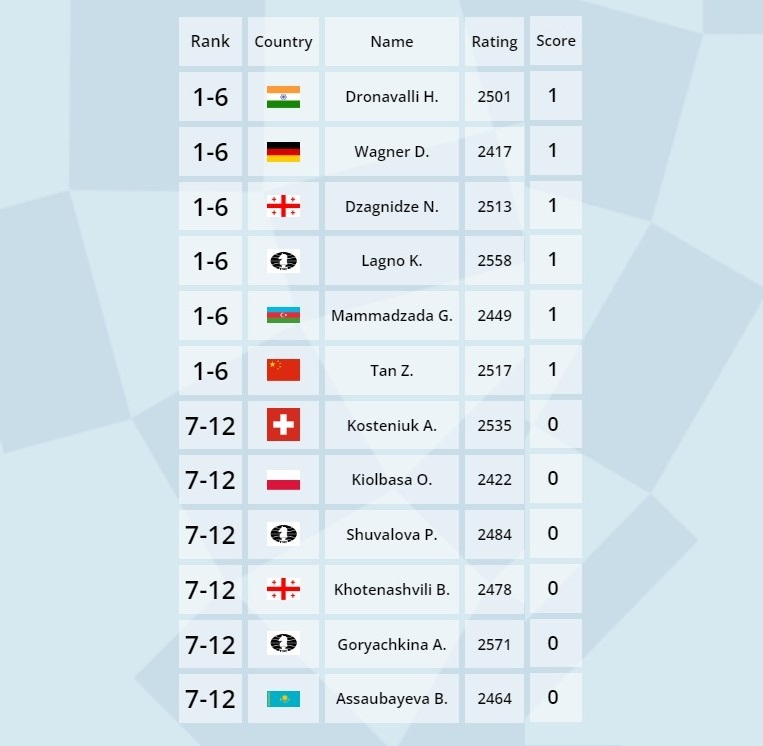

About Freedom Finance Europe
Freedom Finance Europe, a subsidiary of Freedom Holding Corp., is a leading European stockbroker. The company's Freedom24 web and mobile app investment platform provides traders with direct access to 15 global stock exchanges, including NYSE, Nasdaq, LSE, Euronext and others. Freedom Finance Europe is licensed by Cyprus Securities and Exchange Commission (CySEC) with the right to cater clients from EU and EEA countries. The company is rated "B/B" by S&P Global Ratings. Headquartered in Limassol, the company has tied agents and representative offices in Berlin, Madrid, Paris, Milan, Vienna, Warsaw, and Athens.
More information: https://freedomfinance.eu
Freedom Finance Europe, a subsidiary of Freedom Holding Corp., is a leading European stockbroker. The company's Freedom24 web and mobile app investment platform provides traders with direct access to 15 global stock exchanges, including NYSE, Nasdaq, LSE, Euronext and others. Freedom Finance Europe is licensed by Cyprus Securities and Exchange Commission (CySEC) with the right to cater clients from EU and EEA countries. The company is rated "B/B" by S&P Global Ratings. Headquartered in Limassol, the company has tied agents and representative offices in Berlin, Madrid, Paris, Milan, Vienna, Warsaw, and Athens.
More information: https://freedomfinance.eu
